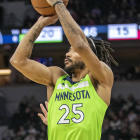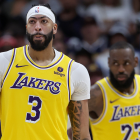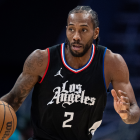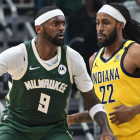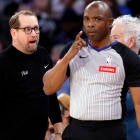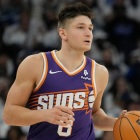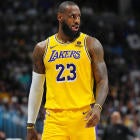MINNEAPOLIS -- Derrick Rose is scoring more than he has in six-plus years, since the postseason ACL tear that began a string of knee injuries in 2012. He's turning the ball over at a lower rate than he ever has, and has increased his scoring efficiency to the best rate of his career. Only Karl-Anthony Towns carries a bigger scoring burden for the Minnesota Timberwolves than Rose's 18.4 points per game. The 30-year-old has to be considered the leading candidate for sixth man of the year.
It's hard to think of a more surprising individual basketball renaissance in the NBA so far this season than Rose's renaissance with the Minnesota Timberwolves.
The main reason is obvious: Rose is healthy for the first time in a long, long time. He's only missed two games so far, after playing in an average of only 36 games per season since 2012. This offseason was the first time he had a fully healthy offseason in years, and Rose was able to work on his game instead of just working on getting his body right. "When I visited with him this summer," Timberwolves head coach Tom Thibodeau said when I asked about the difference in Rose's game this season, "I could see the bounce was back. Just the way he was working in the gym, that's something he couldn't do the previous five summers."
But the other huge reason for the Rose renaissance has to do with 3-point shooting. Even when his game was MVP-caliber, Derrick Rose has never been known as a 3-point shooter. Until this season, he was a sub-30-percent career shooter from deep. When he played for the New York Knicks a couple seasons ago, it was as if Rose was terrified to shoot 3s; he attempted less than one 3 per game and made them at a 21.7 percent rate.
That is why it would have been easy to write off Rose's performance in last season's playoff series against the Houston Rockets, when at times he seemed like the Timberwolves only offensive force; he made seven of the 10 3s he took that series, but that's an infinitesimally small sample size.
This season? Rose ranks fourth in the NBA in 3-point percentage, dropping bombs at a 47.6 percent clip. We'll see if it lasts -- that high of a percentage certainly feels unsustainable -- but we're a third of the way through the regular season at this point, well past small sample size time. In fact, Rose enters Wednesday's game at the Sacramento Kings (10 p.m. ET, watch on fuboTV with the NBA League Pass extension here) having made 40 3-pointers on 84 attempts in 25 games, putting him on pace to not only easily set a new personal best for accuracy, but also challenge his MVP season's 128 made 3-pointers (on 33.2 percent shooting) for most in a single season.
You'd think that Rose's new skill set must have been a case of spending hours with a shooting coach and tweaking his shooting form in the offseason.
And you would be wrong. When I asked him, Rose told me it has nothing to do with mechanics and everything to do with the way he approaches shooting mentally.
"Not thinking -- it's just not thinking about it," Rose replied. "It's kind of weird, having guys running at me at the 3-point line now. It's kind of cool to see they're giving me a lot of that attention out there."
Attention as in this: A player who teams used to dare to shoot the 3 is now seeing double-teams when he comes off the bench.
"They're double-teaming me off the bench!" Rose exclaimed. "That's something I never would have thought of for a player coming off the bench. You're most times not going to double-team anyone coming off the bench. For me to have that type of presence on the floor coming off the bench, it just opens up the floor for everyone else so that Dario (Saric) and other players can have easy shots or easy looks at the basket."
Rose points to a simple, universal truth as what has changed his 3-point shooting: When you believe in yourself, good things happen.
It's one thing to go into the gym and take thousands of shots. That's important, and a big part of the process of Rose's renaissance. But it's quite another thing to take that work you put in and convert it to the game.
"I have a best friend," Rose said. "When he was playing basketball (with friends), he used to shoot a ton of shots. But in the game he used to revert back to not shooting. We used to talk about it: 'Bruh, how do you work out that much but you don't believe in yourself in the game?' We were in high school. And ever since then, I told myself I wasn't going to become that player where I work on my game only in the gym, but when I get out in front of thousands of people, you kind of get shy. I said I wasn't going to become that player."
It's an astounding mid-career reinvention for a player who has experienced the heights and the depths of basketball stardom. Rose won the 2010-11 NBA MVP as a hometown hero for the Chicago Bulls and the face of Adidas basketball, only to see that limelight fade with a series of debilitating injuries. He also faced allegations of sexual assault in a federal civil trial in 2016, resulting in a slew of intimate and personal details of Rose's life being made public before a verdict in his favor, which the accuser is appealing.
Rather than paint his recent on-court success as some sort of personal redemption, better to think of it as one of the most impressive basketball reclamations we've seen in recent years. Rose has always been a downhill player, unique in the barely-in-control chaos that he brings to the game as he's hurtling toward the rim. However, he never had the confidence in his shot like he's showing this season. Can you imagine how good Rose might have been pre-injury if he'd shot it like this?
"Every great act reinvents themselves, no matter if it's entertainment or in the sports world, musicians, whatever," Rose said. "Every great act reinvents themselves. And that's what I'm doing this year."















